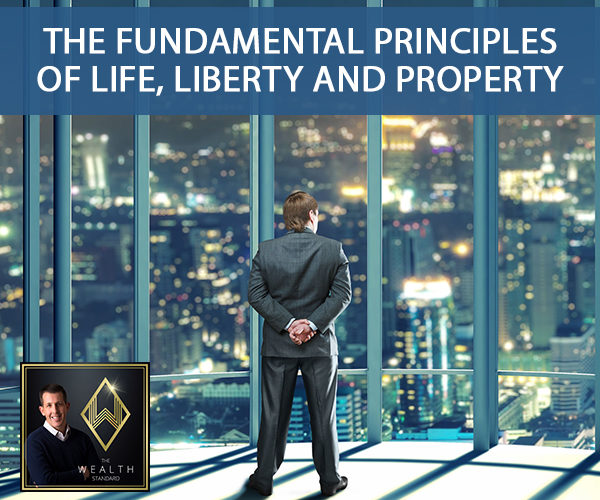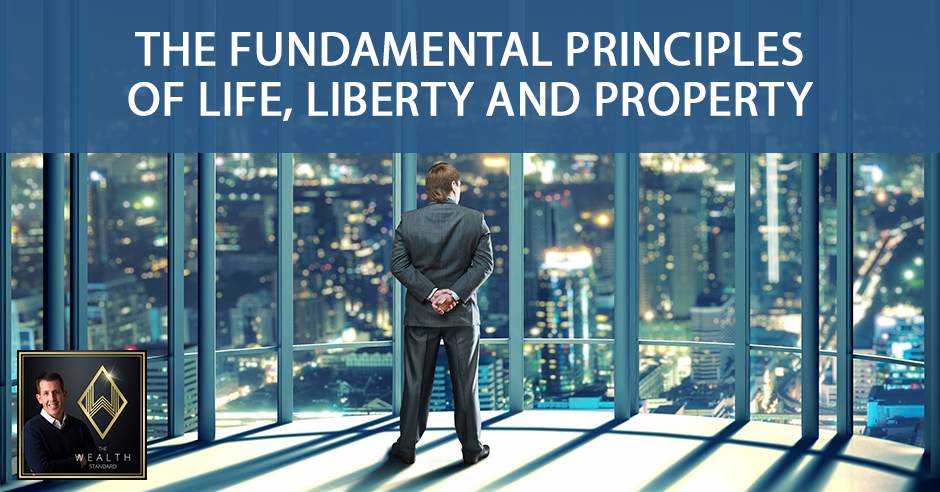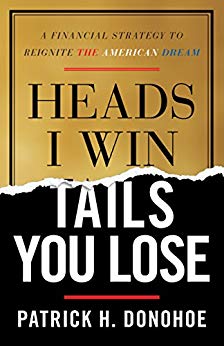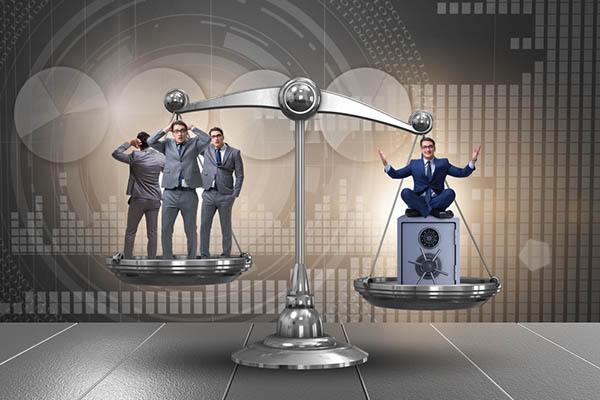Reflections On Capitalism And The Morality Of It with Craig R. Smith
Podcast: Play in new window | Download
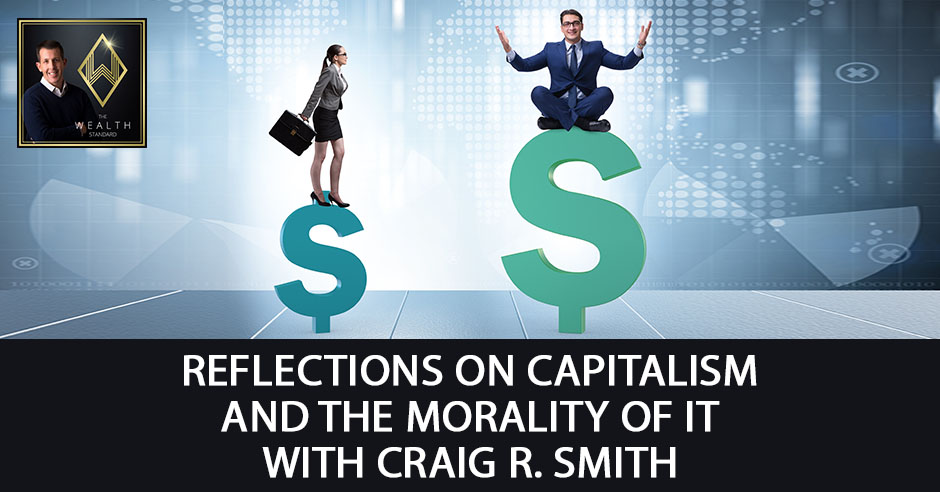
Capitalism seems to have more bad than good reputation among people. Breaking down some reasons why it is misrepresented is Chairman of Swiss America Trading Corporation, Craig R. Smith. He gives his thoughts about capitalism and the relevance of money in a laissez-faire capitalist society. He talks about China, the government, and what they have been doing to the markets. Helping those who are still grappling with the monetary system, Craig defines sound money and why it is important. He also reflects about humanity, equality, and where we are headed in the next ten years with our current situation. Ultimately, amidst everything going on in politics, he reminds us how we, the people, are the government.
—
Listen to the podcast here:
Reflections On Capitalism And The Morality Of It with Craig R. Smith
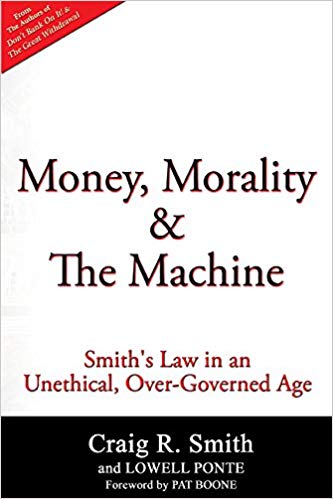
Money, Morality & the Machine: Smith’s Law in an Unethical, Over-Governed Age
We are going to be talking about money and our monetary system. I have an expert with me to help navigate this sometimes difficult to understand topic. My guest is Craig R. Smith. He’s the Chairman of Swiss America Trading Corporation. He has also written a number of books including Money, Morality & the Machine as well as Don’t Bank on It!: The Unsafe World of 21st Century Banking. Craig, thanks for taking the time. I’m excited about the conversation.
Patrick, it’s great to be with you.
Our focus or this theme that we have for the next several months is around the nature of capitalism, what it is and why it’s misrepresented sometimes. I would love to hear how you think about capitalism, but also the relevance of money in a Laissez-Faire Capitalist society?
Let’s talk about capitalism. Capitalism clearly historically is the one form of societal thinking that pulls people out of poverty. This is one thing that very few people are talking about. Perfect modern-day example of that is China. China is a communist nation. We tend to forget that they are red communists. If they have to starve ten million of their people to save their country, they will do that. They embrace capitalism. All of a sudden, 1.3 billion Chinese people have a pathway to get out of their poverty. When you look at capitalism and how it changes society, it changes a society because it eliminates poverty. It rewards merit. It rewards hard work. It rewards results. Unlike socialism, you don’t have to do anything. You don’t have to produce anything. You don’t have to play by rules. You are taken care of. Capitalism is by far the most superior form of societal cooperation than any other system out there. Take a capitalist like John Rockefeller. When he took over, kerosene was $0.85 a gallon. When he retired, kerosene was $0.10 a gallon. Did his capitalism help the average person or did it hurt the average person? I would argue it helped the average person.
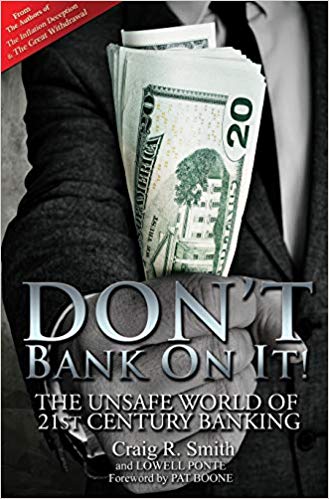
Don’t Bank On It!: The Unsafe World of 21st Century Banking
I love the examples you’re using because China is not considered necessarily a capitalist society, but yet as they’ve gravitated toward that, giving a little bit more freedom, a little bit more openness associated with the trade. It’s benefited so many people even though it’s not a full capitalist society, even small aspects of it make a difference. I would say it’s similar to the US. Correct me if I’m wrong, I don’t think there’s ever been a pure Laissez-Faire Capitalist society. Are you saying that any increase in those tenants ultimately is going to benefit everyone?
It’s no different than the principles of gravity, they work. You can argue against them but jump out of an airplane and see whether your argument holds water. The tenants of capitalism, when they are applied properly, work very efficiently because you have markets. Markets can remove excesses, can get the price right. Price discovery and markets give us the ability to grow. I can think of capitalism. I can go all the way back to people like JP Morgan. People think he’s a banker, or some of these guys that did the financing on things like electricity that ended up lighting America, that ended up heating our homes, that ended up allowing factories to run 24 hours, seven days a week. This is the thing we have to keep in mind. Capitalism takes natural resources in the form of steel, copper, so on and so forth. Combines it with human resources, labor along with technology and capital markets and creates a product, and that develops an economy. This is what we have to be careful about. Our government has gotten so big, the government doesn’t produce anything and yet they take $4 trillion a year out of the economy.
They’re also adding almost $1 trillion each year.
It’s ridiculous. Remember, I talked about markets. Markets are going to get this right pretty quick. We talk about the national debt and we talk about the trillion-dollar a year deficit that we have? People say, “They don’t matter. We were at $10 trillion, it didn’t matter. $15 trillion under Barack Obama, $20 trillion now under Donald Trump, $22 trillion. Why does it matter?” Deficits don’t matter until they matter. The day that they matter is a day too late.
Craig, first off, maybe define sound money. What does that mean? For those that don’t necessarily understand our monetary system. Talk about maybe the importance of sound money when it comes to having a very capitalist type of society.
Money in its nature has to have certain characteristics. Number one, money has to be divisible. In other words, you have $1, $10, $20, so on and so forth so you can make a change. Money has to be scarce. It has to have a store value. Our money is not scarce. As long as they’re growing trees, you can make more money. There’s no store value. If you put $1 away in 1900, that $1 now is only worth $0.2. It didn’t do a very good job as a store value. In America, we used to have a gold standard. When we were on the gold standard, our money remains sound. Matter of fact, there are many periods in the 1800 where the US dollar became stronger. You were able to buy more goods and services with your money. When Mr. Roosevelt decided to recall the gold in 1933, and subsequently Mr. Nixon closed the gold window on October 15th, 1971, we took all gold out of our money. We systematically started devaluing our money. That trend is not going to change. We are on a downward spiral to where one day the dollar, in my opinion, will be replaced with an alternate currency, probably maybe the Chinese or the Russians or maybe even the IMF will come out and issue a gold back currency.
To answer your question, sound money has to have something behind it. We don’t have anything behind our money anymore other than the full faith and credit of the United States government. Go look at $1. It says, “This is legal tender for all debts, public and private.” What does that mean? Your dollar is a debt instrument. It’s not money. Money, in order to be money, cannot be encumbered by something. All we use in our money system is an IOU that we pass on to somebody else. In other words, Patrick gives me an IOU and I go down to the grocery store and I use that IOU with somebody at the grocery store. It works very well as long as everybody recognizes that paper. If that grocer says, “I don’t recognize Patrick,” that I will use nothing. Patrick doesn’t have any money.
Price discovery and markets give us the ability to be able to grow. Click To TweetI think right there is where you hit something that I want to make sure that I understand correctly because you’re the expert here and has spoken to it for so long. I would say the relevance where you are making an exchange. Money in and of itself represents something. Inherently gold has tangible value. Paper doesn’t have tangible value. You look at the underlying premise of money is the whole mimic of exchange idea where your work, your labor, your goods, as you put it, how you take the resources of the world, the material of the world and combine it with the human mind, labor and production. It creates something of value to other people.
When a person exchanges that medium of exchange, your understanding that it’s worth a certain amount and them understanding that it’s worth a certain amount. The purpose of the actual exchange is that for the person that’s getting the money because they provided the value is now going to go out and do something else with it. The certainty that exists that it’s going to be worth the same amount when they go to exchange it is where the whole sound money idea breaks down. Is that an accurate logic?
It’s very much so. Money, when you think about it in its purest essence, is your labor that’s convertible into currency so you can buy goods and services. You go to work every day. You work 40 hours a week. You get a paycheck the other week. You’re able to take that labor and translate it into a tradable commodity. This is what we have to understand that if that’s the case, which it is. I have to work 40 hours a week, 52 weeks a year to make $50,000. The Federal Reserve can push one button on a computer and create $50 million or $50 billion. What have they done to discount the value of my labor if they didn’t have to do anything to get $50 billion, but I had to work all year to get $50,000? That’s not fair.
Craig, these are the points that those that have studied this understand, but for those that don’t study this that this may be their first exposure. That right there what you said, is the heart and core of the issue, is that when you have a central power that has the authority to increase that amount of money that’s in circulation through whatever means, number one, it’s fake. There was no value produced for that. It dilutes and it essentially takes from those that did provide value. It’s everyone. It has been going on for a long time. It’s still that the overriding narrative is to continue to do this because it’s a good thing.
Governments by nature will never be satisfied. They always have to have more revenues. If the government was to move your tax rate, and I’m using a hypothetical here, from 32% to 80%, more than likely we probably have a revolution. Is that fair to say?
Absolutely.
If they leave your tax rate where it is and they devalue your currency, they can get the same effect. You don’t even realize this happened. In other words, if they hit you with an 80% tax, you would revolt. You wouldn’t pay for it. If they devalue your money every day and you have to use that money to survive, they are in essence taking more money from you in the form of depreciating the currency. They can’t tax you so they depreciate your currency. The Chinese are famous for this. They’re currency manipulators. This whole bit about our trade talks with China, it’s a joke because if tomorrow we cut a new deal and they don’t like the deal, they’ll play with their currencies and work it out through their currency. This is what the Federal Reserve has done. They’ve stolen from every American. Years ago, we did a study about it.
We can argue that there have been $100 trillion that’s been stolen from the American people since 1913 when we formed the Federal Reserve by what’s called financial repression, by paying people an interest rate that’s substantially lower than the rate of inflation. We’ve seen that happen and by using inflation as a form of taxation. I did a whole paper for the Congress years ago entitled the uses of inflation. I showed how back in the ‘50s, our Federal Reserve chairman wanted to do away with federal income tax. He said, “We don’t need a federal income tax. I’ll play with the currency and we’ll get our revenues through the currency.” Nobody talked about that. His name was Beardsley Ruml. If you read what he was proposing to the federal government, it will turn your hair.
Deficits don't matter until they matter; and the day that they matter is a day too late. Click To TweetThe introduction I made where the wool is over our eyes is that this type of conversation is not prevalent. It is something that affects literally everybody every day. There are different ways to approach this. The common narrative is so strong that a central bank is a good thing. It’s the lender of last resort. It protects us. I look at it as very similar to how we perceive the government in general. I say we, I’m talking as a society, not me particularly. As a society, the government is there because if they weren’t there, then we wouldn’t have roads or if they weren’t there then people wouldn’t have jobs.
You know the fallacy of that because the reality is if you go back 150 years ago in America, we didn’t have a Leviathan government as we have. People weren’t dying in the streets from malnutrition or for lack of healthcare. We didn’t have any of that. We didn’t have welfare or social security or anything back in the 1800s. I didn’t see elderly people dying on the streets or anything. We have to keep in mind we’re pretty a benevolent nation. We take care of each other. The bigger issue is it’s important that we hit on this. I could never have this conversation I’m having with you on that national television show. I could never have it because they say, “You’re a conspiratorialist.” The facts are out there. You know them and I know them. All a person has to do is read and use a little common sense.
You draw the conclusion that this Federal Reserve is a very failed experiment. We should unravel the Federal Reserve. We should abolish it. We won’t because of the powers to be as I write about Money, Morality & the Machine realize that the money is more important to them than morality. Keeping the machine going and Washington, DC is more important than at all. As a direct result of that, we are not going to see things change. Short of us having a revolution. When I talk about revolution, I’m not talking about a 1776 revolution with guns. I’m talking about people revolting and going to the polls and saying, “We’ve had enough. We want a government that will work for us instead of working against us.”
It’s interesting to see how humanity operates that way where something bad has to happen in order for there to be a paradigm shift. The reason why you can’t have that conversation and it’s very difficult for anybody to have that conversation especially with opposing opinions in an intelligent way. There are so many layers behind it that it almost gets to the point where it’s not the same context. Therefore, you are so many layers above context that it’s “I’m right, you’re wrong” type of rational thing.
It becomes an ideology. You’re right. It’s an ideological argument.
The physical revolutions, I look at where we’re at in our society, I don’t know. I’m hoping that people start to wake up, but at the same time it’s most likely going to be through some pain where people wake up and step back and say, “We’re going to be in this government shut down when we went this long. Why do we need the Federal Reserve? Why do we need this?” Hopefully, people started waking up and asking more questions, better questions.
I said on national television the government doesn’t produce anything, so why are we worried about it hurting our GDP? The government spends money. We have to worry about if the government can’t process small business loans and small businesses can’t operate, and that would affect GDP. I get that. As far as I’m concerned, if Donald Trump wants to do something brazen, fire the 800,000 workers like Ronald Reagan did with the air traffic controllers. They’re non-essential employees anyway. Has your life been affected since they went on vacation? I say get rid of them. Let’s get rid of a million employees at the federal level and let’s reduce the size of government and who knows? Maybe we can even lower taxes ultimately. There’s a big flaw. I want to bring this up before we get too deep in the weeds. The flaw with the Federal Reserve is simple to explain to every single American. Watch this, Patrick and Craig, we moved to a desert island and we start a money system.
The 2008 crisis is not an exception. It's a rule. Click To TweetWe get the local guys. We come up with dollars. We decide we’re going to use dollars. We lend out $1,000 to the locals at 5% interest. Now the locals owe us $1,000 principal and $50 interest. If you and I only printed $1,000, how can they pay us back? There’s not $1,050 out there. I have to create another $50. I lend that out. I need to borrow more and more. That’s the point. Every year you’ve heard the feds say our inflation target is 2%. They have to have inflation to survive. Let’s say it’s 2%. Every 50 years, you lose 100% on your investments. That’s not a very good deal. Nobody is talking about it in these terms. It’s flawed. It doesn’t work. That’s why you wonder why we’re talking about trillions now. Go back to the $1,050. We need to create $1,050 payback. We need to create $1,200 payback. Now you know why we’re at $100 trillion. Just so your readers know, if you were to spend $1 every second for the rest of your life, it would take you 32,000 years to spend $1 trillion. We owe $22 trillion of those?
Plus you add benefits or social programs, Medicare.
Our long-term liabilities are well in excess of $150 trillion.
I’m glad we started by getting into the morality of it because of a lot of the other episodes that have been done have talked about the morality behind things because I look at that being one of the foundational tenants that people don’t understand. I’ll bring up an example. I made the mistake of turning on the local news to see a Jazz game score on a snow report. On there was basically, there was this huge rally of people that all opened their businesses, opened gyms, the food bank opened up for the federal employees that didn’t have any work who are struggling financially.
I look at the nature of us and the nature of us wanting to help. There’s this confusion associated with central powers what it is and what relevance it has, whether it’s a good or a bad thing. I’m bringing up that people naturally want to do the right thing and do good for society. The government, in theory, I would say right now isn’t necessary. You look at how it continues to perpetuate and it strengthens the paradigm and makes it all the more difficult to get people to wake up. It’s inevitable because of how extreme the negative results and the outcomes have been. Right now it’s getting papered over until who knows when. It could be any type of event but when it goes, it’s going to go quick.
When it goes, you’re going to see the unraveling very quick. When people talk about a crisis or a meltdown or a recession, we’ve got to keep these in real terms. We went through the Great Depression in 1933. If you talked to anybody that lived during the Great Depression, they’re now in their 90s. They will refer to the Great Depression as the good old days. They don’t see it as negative. We went through recessions in America in the ‘60s and the ‘70s. We had the inflation crisis in ‘79, ‘80. Here’s my point. When we have meltdowns, people get rich and people get poor, but you don’t have people dying in the streets or lining up for food. It’s not how it works anymore.
I hear people calling for the market is going to melt down. You start thinking to yourself, “Is it going to be Mad Max at the grocery store? How am I going to feed my family?” No, it’s not going to be that way because there’s no benefit. I have one neighbor who half of his house is underground. I said, “Richard, what are you doing?” He said, “It’s when the bands of criminals come down the street.” I said, “Are you crazy?” We have a military. We have the police. This is the point. In run-ups in markets, people get rich, people get poor. Drops in markets, people get rich, people get poor. What we’re trying to do is wake up the American people and say, “We’re going to have more crises.” 2008 is not an exception. It’s a rule.
We have them every so many years in America. You need to be prepared for them so that you don’t panic. Think about if you didn’t panic in 2008, you’re already back to where you started and you’re way ahead of the game in stocks. We try and show people that if you have a diversified portfolio and that you have planned your future, you’re not going to have to worry about these ups and downs in the market. You’ll be able to sleep well at night and know that you have a game plan that’s protecting your financial future. That’s why I wrote the book, Money, Morality, & The Machine. That’s why the deal I cut with the publisher was for every one book we sell, we give a book away because we want to wake up the American people. They’ll call programs like yours to discuss these issues because the American people have the answers. We’re smart.
Sometimes our intelligence gets stifled because I’ve thought oftentimes crises are a good thing at a large level, even at the individual level. As human beings are so resilient and when we’re put to the test is where we thrive and where we learn and we discover.

Capitalism: When we’re put to the test is where we thrive, learn, and discover.
It normally takes a crisis for a major paradigm shift to occur. Is anybody going to tell me that we don’t need a paradigm shift in America? Have you watched the news? Have you watched Alexandria Ocasio-Cortez or whatever her name is, talking about we want to eliminate billionaires? That would have been good. Let’s see, maybe we should not allow a John Rockefeller to be a billionaire. Nobody would have light or maybe Bill Gates, we shouldn’t let him be a billionaire. He’s revolutionized computers. This talk is crazy that we have coming out of Washington.
It’s done under the guise of morality that this is the right thing. People should be equal. Not understanding the nature of equality and what that means. It’s interesting. It goes to show that this pervasive message of what is moral, what is ethical, how things should be, and what the purpose of government is. It’s out of whack. There are strong voices on both sides. It’s become this right divisive fight. That’s why the truth I don’t think is discovered unless that fight gets magnified. There’s a crisis. Suddenly people wake up during that typically. It’s interesting. It’s a fascinating time to be around where you and I can talk about this. The message can be spread.
Craig, these are our opinions. This is how we see things. We’ve connected the dots in so many different areas. We’ve read similar books. You have a much more extensive education and background than I do. I look at our ability to communicate our ideas. That’s going to continue because there are principles of truth that are true. People feel that and when it’s applied to specific situations, that’s when wake up occurs. Right now, it’s a difficult time. It’s also exciting that you can start to see what’s going to happen in the future.
You hit something that strikes me. You’re right on the money. Truth is it doesn’t matter whether you believe it or not. It doesn’t change what the truth is. It’s like a lie. A lie has to keep changing in order for it to live because if it doesn’t keep changing, it will die. The truth is the same now as it was 10,000 years ago as it will be 10,000 years in the future. You said something about equality that is spot on. A very dear friend of mine, Mike Savage, you probably know him who has a national talk show. He has a saying that says, “You can have no equality without quality.” I want you to think that through. We can’t have equality in this country unless the people are quality people.
It normally takes a crisis for a major paradigm shift to occur. Click To TweetLook at the people who are calling people racist, are they quality people? I don’t think so. We’re looking for this equality on whose scale on some guy from Black Lives Matter, from Antifa, from the Tea Party. Whose perspective are we looking at here? This is the problem. We’ve lost our ability to be human with each other. I could argue it’s because of cell phones and all this stuff. We’ve lost our humanity. If we lose our humanity, De Tocqueville told us that the greatest strength we have as a nation is our humanity. I hate to sound negative. I feel very optimistic about the future of America. However, the next ten years I think we’re going to experience some very difficult times.
Craig, everything you said has been brilliant. I look at humanity and I’d also say that during times of crisis is where humanity shines too. You saw many examples, whether it’s natural disasters, how people come to the rescue. I think we’re driven that way. We have this instinct inside of us to do the right thing. There are exceptions because we all have an irrational side of us as well. Generally speaking in crisis, you have a lot of good that comes from that. It is so much divisiveness. I had a cool experience a couple years ago going to Hawaii with my kids. It was a Disney-type of resort that they have there. We were swimming. There were these guys like a gangster, tattoos they had. They were like human having discussions with me laughing. It’s one of those things where everybody has this humane side. We all in a sense will resonate or talk to one another even though there are so many differences. It’s powerful but typically, the environment is what creates so much divisiveness.
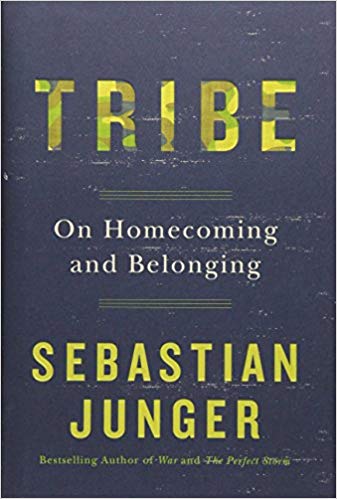
Tribe: On Homecoming and Belonging
What you brought up is so important. We should elaborate on this. There’s a book out that I encourage you to go read. It’s called Tribe by Sebastian Junger. In the book, Sebastian Junger studied war-torn societies, England after the famous bombings in London, Kosovo, and Sarajevo. He found out something fascinating. He found out that after the crisis was over, the people wanted the crisis to come back because when the crisis was happening, neighbor was taking care of neighbor. Brother was taking care of sister. Mother was taking care of son. Everybody was taking care of each other. In London, they would go down to the air raids bonkers when those sirens would go off. After the war was over, what the English people did was they congregated down in the bomb shelters. They missed getting together. Here’s the point, do you remember how tight we were as a nation in 2001? Remember George Bush on that puddle, “The people that tore down these buildings, they’re going to hear from all of us soon.” I felt like an American.
I’ve got to tell you something. We’re going to have another crisis. We have threats all over the world. I’m not going to telling you militarily. I’m talking about financially. We got China. We got Russia. Don’t underestimate India by any stretch of the imagination. The European Union, they’re trying to hold themselves together right now. Keep in mind, the European Union collectively is a bigger economy than ours. Individually, they’re not. As a European Union, they are bigger than we are. We have a lot of threats that we need to be thinking about on a long-term basis that is existential to this nation. One of them I believe happens to be our money system because if you devalue our money system, how are we going to be able to fund anything to be able to protect our interests? I’m incredibly concerned about the future of money because money, as much as we hate to admit it, has the morality to it. I talk about this in my book. Every moral decision in America has a financial consequence and every financial decision in America has a moral consequence. We’re not thinking in those terms.
Adding to that, I’d also say that behind every transaction is the nature of a human being to provide value to one another and use their abilities, use what their unique at, and also the process of figuring out what is valuable to others. It’s one of those things where money also has a very individual aspect in addition to what you mentioned.
Sometimes people misinterpret money too. Think about the guy that’s got $5 million in the bank and he’s drinking himself to sleep every night. He doesn’t think he has any problems because he’s got money. I would argue his problems are worse than the guy that’s on the street who is a drunk, who knows he’s got trouble because he can’t mask it because he lives in a fancy house. This is where we are in society. Money is merely a tool. It gives us the ability to trade, to buy, to sell, to live our lives. It shouldn’t represent who we are. My checkbook should have nothing to do with the quality of human being that I am. The minute that it does, we’ve lost as a society. What do we need government for? If men be angels, we don’t have any need for the government. The reality is men aren’t angels. The reality is men do things very immoral. That’s why I was very disappointed in 2008 that none of the bankers or some of the people that created some of the problems like Mr. Mozilla didn’t have to pay a price for this. Think about what happened in 2008 and nobody was held accountable.
It was worse. They made all the mistakes but yet all of their problems were solved for them.
That’s why I think the average American is getting very discouraged. They’re saying there are two sets of rules. There are sets of rules for the power of powerful people. There’s a set of rules for Hillary Clinton and those people. There’s another set of rules for me. That’s why most people are discouraged right now. The good news is we still are the greatest nation in the world. We still have the greatest capital system in the world. What I’m hopeful for is that these politicians have overplayed their hands. What we saw in 2016 is the beginning of, for lack of better term, a new popular populism in America where the American people get involved. I was very happy that the House went to the Democrats. You’re going to say, “You’re a Republican conservative. How could you say that?” Do you want me to tell you why? Because the Republicans in the House didn’t deserve to hold on to the House because in 2016, what did Donald Trump come back to the White House with? The American people said, “Build a wall.” The American people said, “Did this.” He’s doing those things. Isn’t that what he’s supposed to do? Isn’t that what he run on? Isn’t that what he got elected on?
If we have more of that, then the people are going to say, “If you’re doing your job, we’ll reelect you. If you’re not doing your job, we’re going to throw you out.” That’s what they did to the Republicans. We have a very healthy democracy. When the Republicans didn’t do what they promise in 2016, 2017, 2018, the American people threw them out. Now you’ve got Democrats in there. If they screw up, hopefully the politicians realize that until we start promising and following up on fulfilling those promises, we don’t have a chance to govern. If we do that, we have a bright future ahead of us.
I find it interesting your last couple of statements because you’re right. It comes down to what we as people believe and understand the influence that we do have by electing certain officials. At the same time, we make election decisions in this case based on our belief system, based on what we know. I look at how we’ve been conditioned as a society to understand government, understand their purpose, and understand their nature. That impacts the way in which we vote, where we do vote because this person is going to create jobs, this person is going to do this and this person is going to do that. Maybe you can end with your opinion here, going to quality, the quality of a collective people right now I would say isn’t necessarily making decisions politically electing certain people for the right reasons. As we shift as a society and understand whether it’s the purpose of government or whether not wanting to be taken advantage of because we’re aware of what they’re doing and why it won’t work. That will be hopefully the shift that can create some influence politically where we want different results than we want right now, which would definitely shift power.
I hope you’re right. You’d like to think that the American people get it right every so often. The problem in Washington, DC, I wrote about this in the book, Money, Morality & the Machine, the whole concept of that book is it plays off of Dwight Eisenhower’s warning to us. Be aware of the military industrial complex. What we do is we show how that military industrial complex is a type and shadow of other things that are going on in our government. Here’s how it works. The Congress appropriates funds. They go to build bombs, tanks, so and so forth. We need that for our national defense.
We, the people, are the government. Click To TweetDefense contractors turn around and give donations back to the congressmen and get them reelected. We wonder why some of these guys are like Ted Kennedy in the Senate for 40 years because they have this incestuous relationship with not just the defense contractors but everybody that contracts with the federal government. Whoever is contracting with the federal government, I guarantee you is giving money to the political campaigns. That’s the problem. If we break that, then we’d get our government back. We have the best government that money can buy right now because our politicians are bought and paid for. Our politicians shouldn’t be bought and paid for. The only people they should be responsible for is the American people. That’s why I’m grateful that you’re doing shows like this. That’s why I’m grateful for hosts like you that are talking about these issues. I am convinced if we engage the American people in a dialogue, we will fix this problem. We, the people, are the government.
You’re absolutely spot on there. There’s a lot more going on. I think there was more podcast created in 2018 than ever before. They’re a lot smarter than I am because I’ve been doing this for over ten years, there’s a lot of success in most podcasts. That’s also a good thing because it’s helping spread certain messages. I hear more of it. Craig, thank you for what you’re doing. You clearly contributed trying to understand how our seemingly complex system works and what are the principles behind them, the morality behind it. Thank you for what you’ve done and continue to do. We’ll support you in every way possible. Why don’t you let the readers know the best ways to follow you, see what you’re up to when you speak on this national show live. If you want to talk about ways in which people can follow you, that would be awesome.
I’m a major contributor to Fox so you’ll see me on Fox Business or Fox News every week or so. The best way to stay in touch with us is through the website, SwissAmerica.com. The publisher was gracious enough for every one book we sell, we’re able to give a book away. I don’t know how big your audience is, but I’m sure, 50, 60, 70 books, if they call 1-800-289-2646 and mention that you were listening to the program or mention Patrick’s name, they will send you a complementary copy from the publisher of the book, Money, Morality & the Machine. No hidden charges. They don’t say, “It’s $5 postage.” Everything is free. You call that number, you put your name, address, phone number down and they will send you a complementary copy of the book. All we ask you to do is read it and then engage with somebody like Patrick. I don’t know if you take call-ins, but let’s talk about these issues. Let’s get a number of opinions out there because I’m convinced in a multitude of counselors, we will find wisdom. The best years of America could be ahead of us if we fix some of these stupid problems that are very fixable.
You see signs everywhere that people are getting more engaged, more aware, learning and there’s a lot of accountability associated with media these days. It hasn’t been there before. It continues to improve and ensure that the messages that are out there are sound. We’ll make sure your book and the links to it gets distributed on everywhere we post the podcast and in our social media channels as well, and articulate that offer.
It’s great being with you. I look forward to doing it again.
Likewise, Craig. Have a good one. Thanks for what you do.
Important Links:
- Swiss America Trading Corporation
- Money, Morality & the Machine
- Don’t Bank on It!: The Unsafe World of 21st Century Banking
- Tribe
- https://CraigRSmith.com
- https://www.SwissAmerica.com/
- https://www.Amazon.com/Money-Morality-Machine-Unethical-Over-Governed/dp/0996847634
- https://www.Amazon.com/-/e/B008MCIRYY
- https://Business.Facebook.com/Craig-R-Smith-107964145954741/?business_id=633372893511447
- https://Twitter.com/CraigR_Smith
- https://www.LinkedIn.com/in/CraigRSmithSwissAmerica
About Craig R. Smith
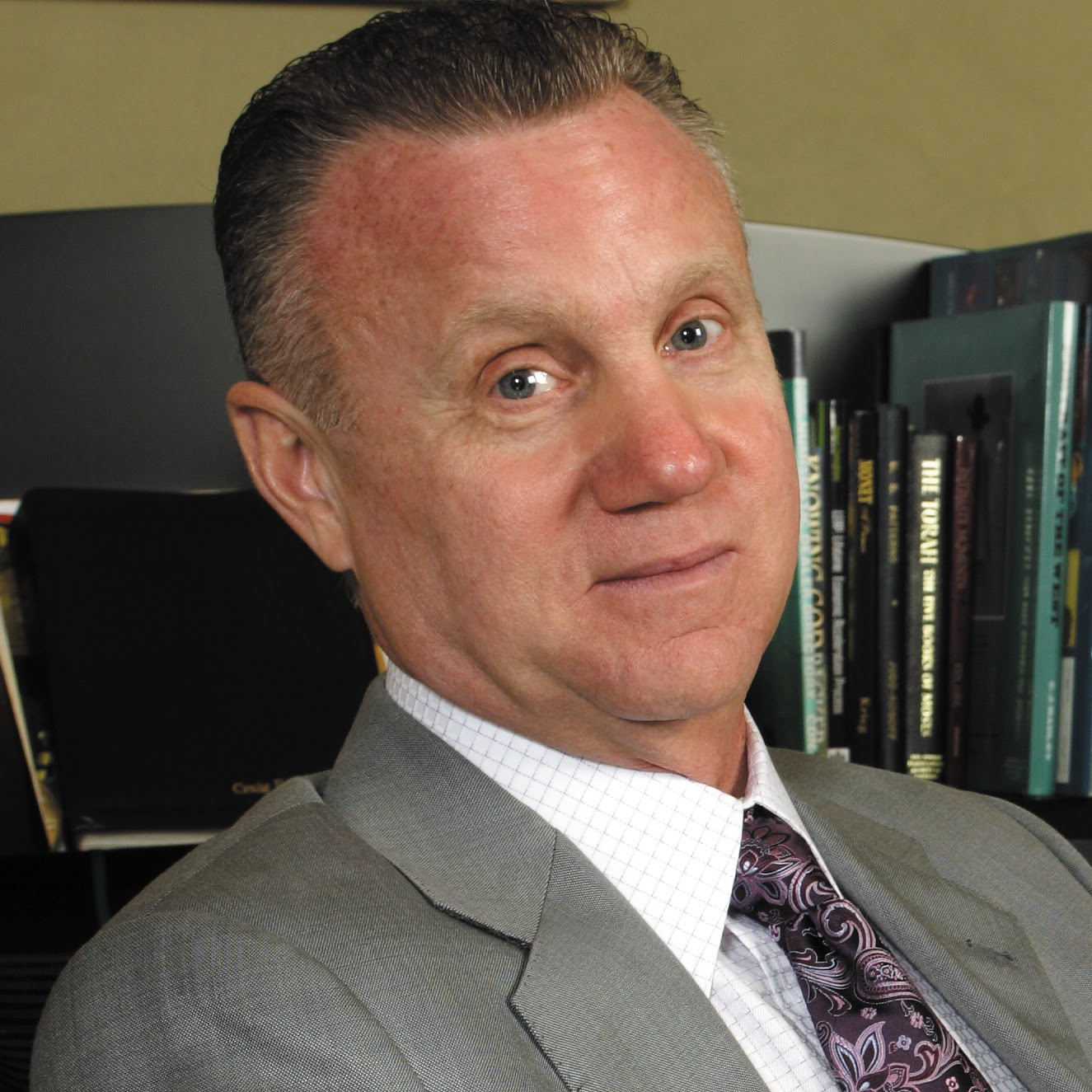
Craig R. Smith is Chairman of Swiss America Trading Corporation, a national investment firm specializing in U.S. gold and silver coins. Mr. Smith founded the company in 1982 out of a bedroom in his home with $50.00. It has since grown into one of the largest and most respected firms in the industry known for its dedication to consumer education and safety.
Mr. Smith is an expert in many forms of tangible assets including; oil, precious metals and U.S. numismatic (collectible) coins. He is a student of history and an author of nine books.
Mr. Smith is sought after by national media for his insights on breaking news because he instantly engages audiences with his common-sense analysis of major political and economic trends. Craig’s door is always open to the media. Over the past two decades, Mr. Smith has been interviewed on over 1,500 radio and TV programs. He has also been featured in various print publications. He is a former columnist for Worldnetdaily.com and writes economic columns for Swissamerica.com
To receive your complimentary copy of Craig’s book Money, Morality & The Machine, please call (800) 289-2646 and mention that you as a listener of The Wealth Standard Podcast!

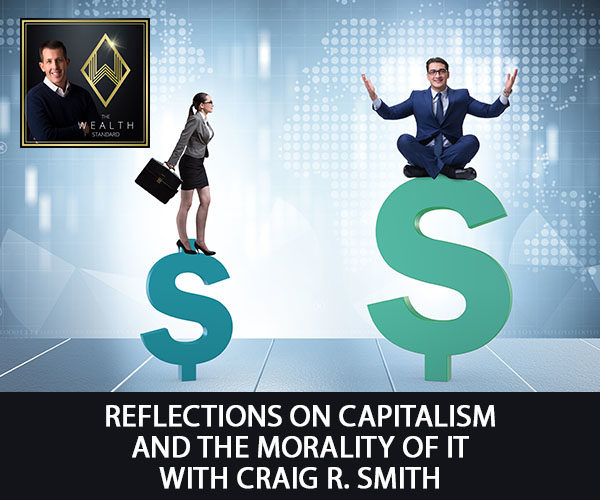
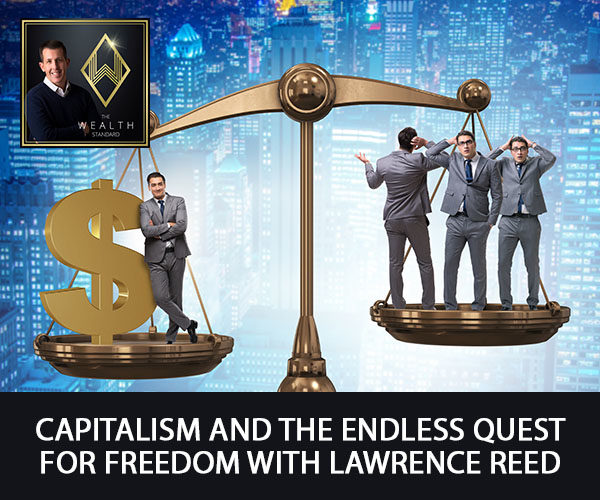
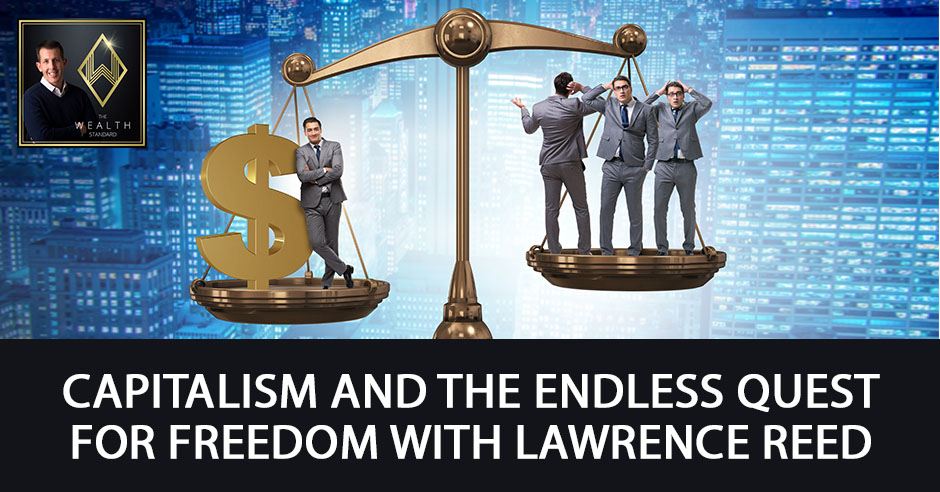




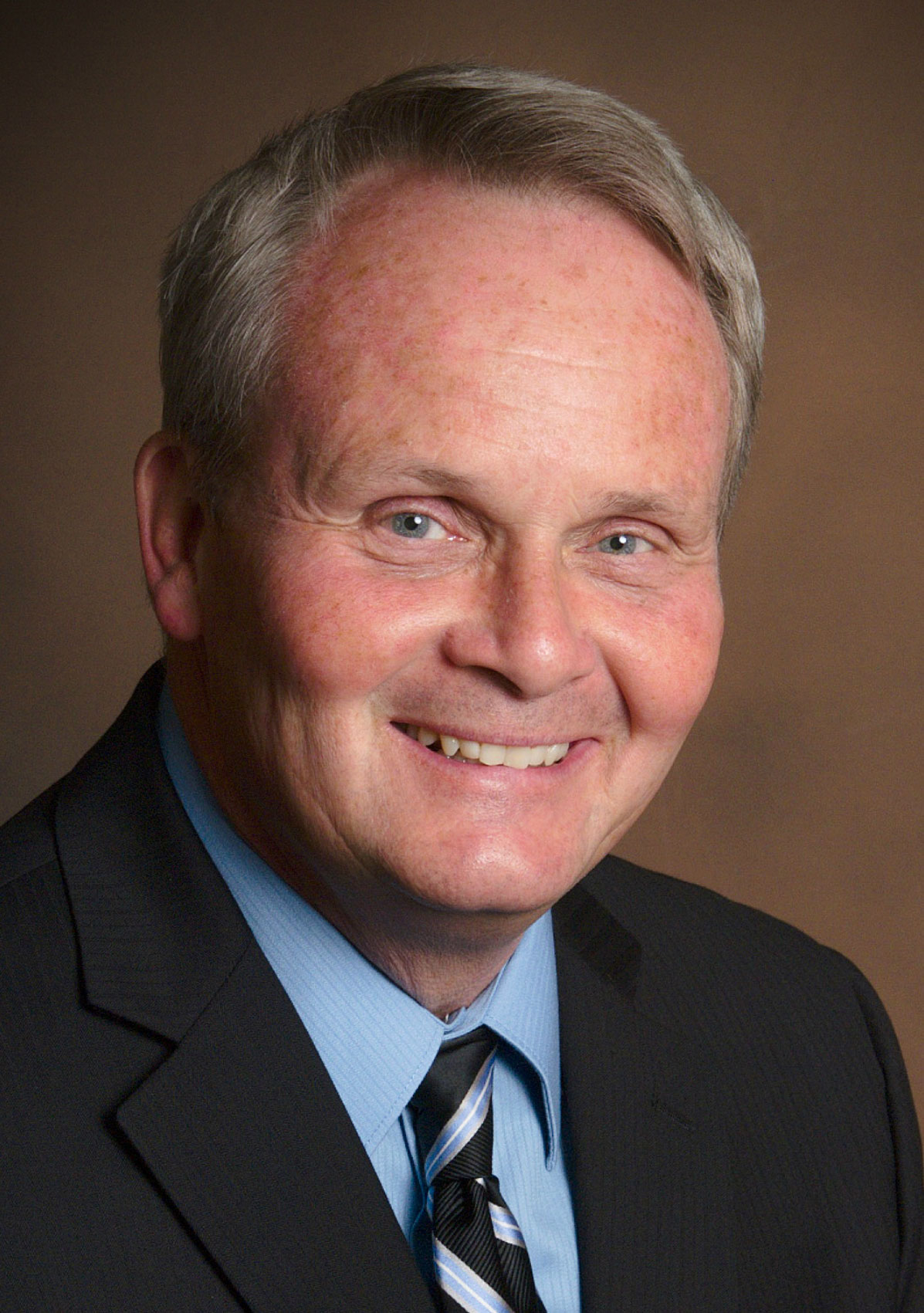
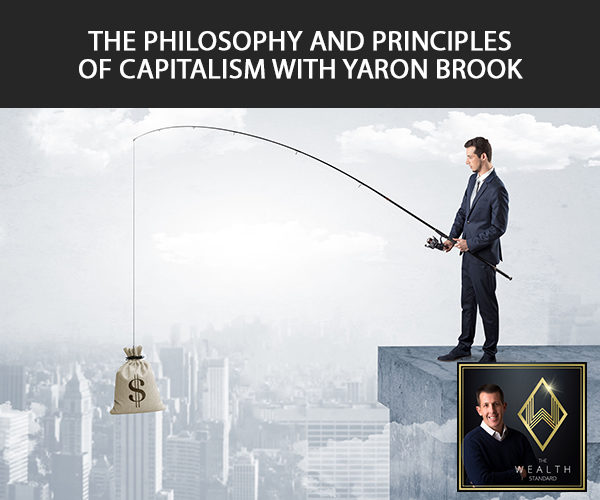
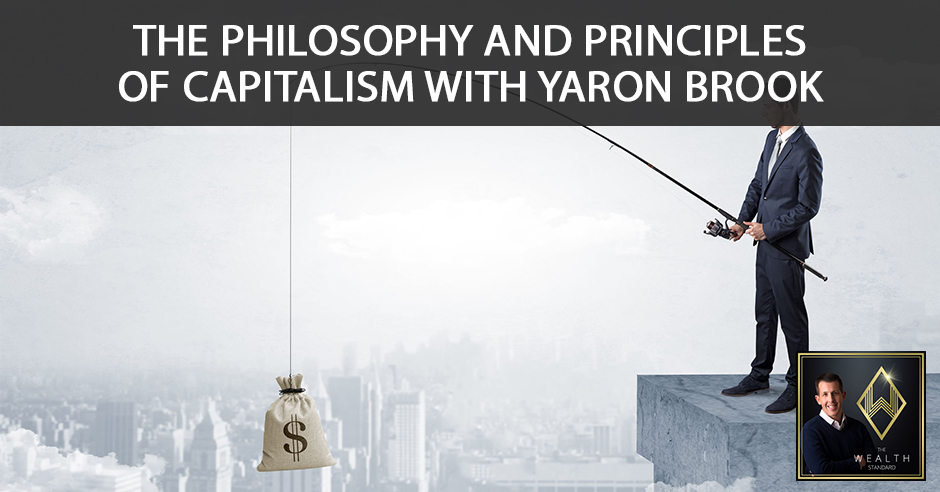
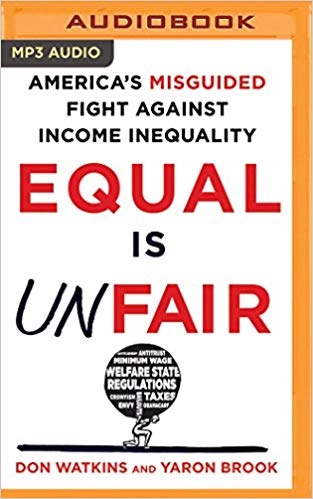
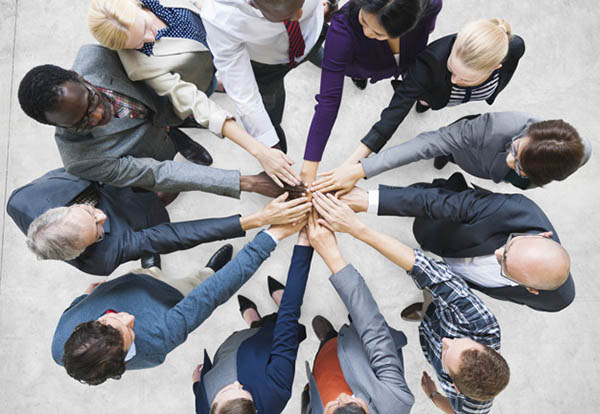



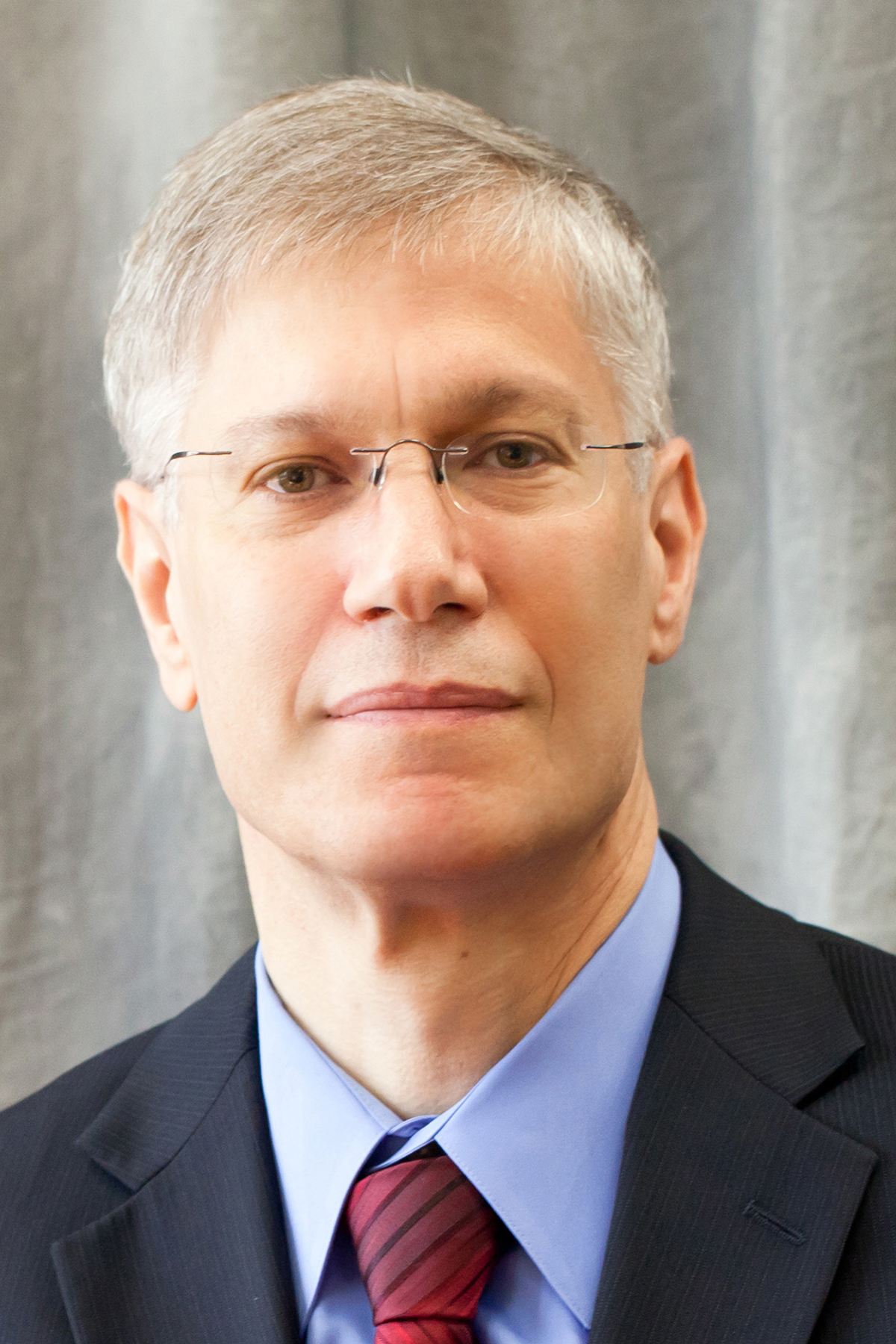
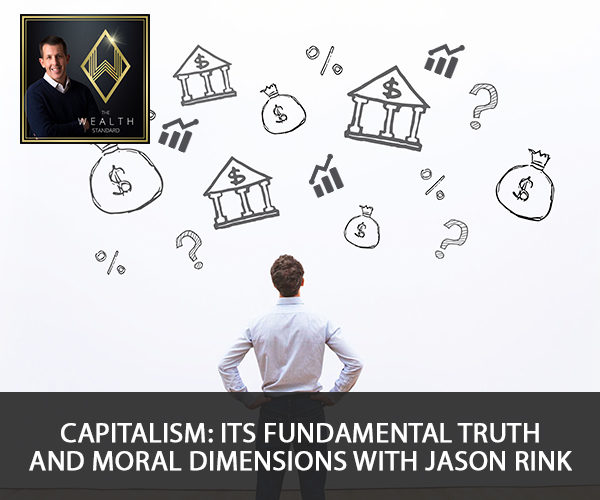
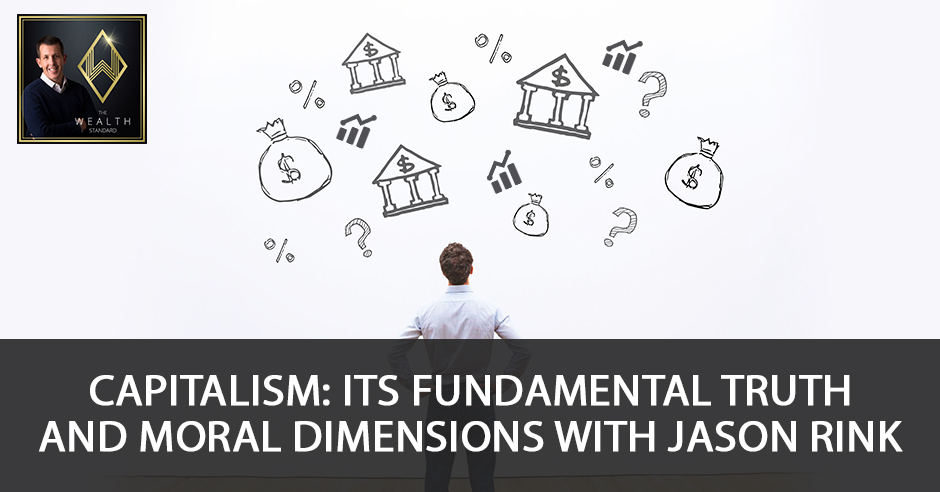

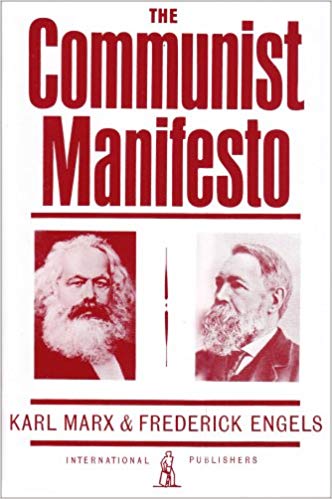
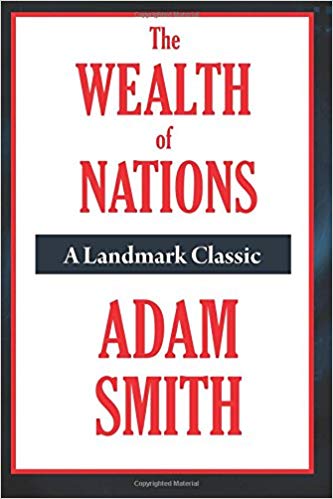
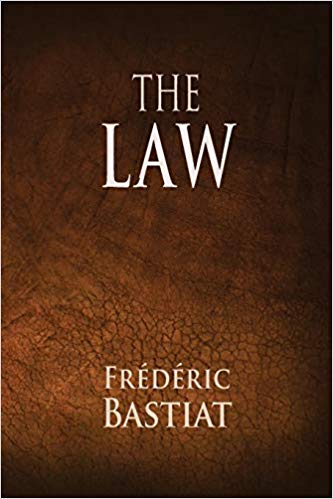


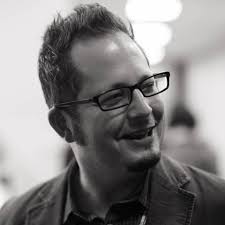 Jason Rink is an award-winning producer and director of documentary films, an author, a marketer, and a self-proclaimed Capitalist. Prior to starting his own company, he spent 10 years in commercial banking, and four years as a producer and director at Emergent Order, a creative agency in Austin, Texas. Jason has worked with Academy Award-winning actor Richard Dreyfuss, Congressman Ron Paul, Senator Rand Paul, and brands such as Aston Martin, the Charles Koch Institute, and Mercer.
Jason Rink is an award-winning producer and director of documentary films, an author, a marketer, and a self-proclaimed Capitalist. Prior to starting his own company, he spent 10 years in commercial banking, and four years as a producer and director at Emergent Order, a creative agency in Austin, Texas. Jason has worked with Academy Award-winning actor Richard Dreyfuss, Congressman Ron Paul, Senator Rand Paul, and brands such as Aston Martin, the Charles Koch Institute, and Mercer.